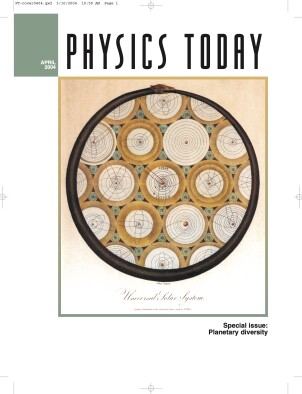APS to Grant Awards at Meeting
DOI: 10.1063/1.2408548
The American Physical Society will recognize the achievements of 17 individuals at its annual April meeting, scheduled for 1 to 4 May in Denver, Colorado.
The Hans A. Bethe Prize will go this year to Wick Haxton, professor of physics and director of the Institute for Nuclear Theory at the University of Washington. Haxton is being honored for his “noteworthy contributions and scientific leadership in the field of neutrino astrophysics, in particular for his success in merging nuclear theory with experiments and observations in nuclear physics and astrophysics.”
George F. Bertsch will take home the Tom W. Bonner Prize in Nuclear Physics for his “many varied contributions to nuclear structure and reaction theory, which have guided and illuminated experiments for four decades.” Bertsch is a professor of physics and a senior fellow at the Institute for Nuclear Theory at the University of Washington.
The Dannie Heineman Prize for Mathematical Physics, given jointly by APS and the American Institute of Physics, will be presented to Gabriele Veneziano, senior staff member at CERN. He is being recognized for his “pioneering discoveries in dual resonance models which, partly through his own efforts, have developed into string theory and a basis for the quantum theory of gravity.”
The Julius Edgar Lilienfeld Prize will go to H. Jeff Kimble, Valentine Professor and professor of physics at Caltech. He is being cited for his “pioneering work in quantum optics, for his innovative experiments in single-atom optical experiments, and for his skill in communicating the scientific excitement of his research to a broad range of audiences.”
Arie Bodek has been selected to receive the W. K. H. Panofsky Prize in Experimental Particle Physics for his “broad, sustained, and insightful contributions to elucidating the structure of the nucleon, using a wide variety of probes, tools, and methods at many laboratories.” Bodek chairs the department of physics and astronomy at the University of Rochester.
Ikaros Bigi and Anthony I. Sanda will share the J. J. Sakurai Prize for Theoretical Particle Physics for their “pioneering theoretical insights that pointed the way to the very fruitful experimental study of CP violation in B decays, and for continuing contributions to the fields of CP and heavy flavor physics.” Bigi is a professor of theoretical high-energy physics at the University of Notre Dame in Notre Dame, Indiana, and Sanda is a professor of physics at Nagoya University in Nagoya, Japan.
The corecipients of the Robert R. Wilson Prize for Achievement in the Physics of Particle Accelerators are Katsunobu Oide and John Seeman. They are being cited for their “technical leadership and direct contributions to the development of high-luminosity B-factories at KEK and SLAC. These machines have set new world records for luminosities in colliding-beam storage rings.” Oide is division head of the KEKB Accelerator at the National Laboratory for High Energy Physics (KEK) in Tsukuba, Japan, and Seeman is the assistant director of the technical division and heads the accelerator department at SLAC.
Juan Maldacena, professor of physics at the Institute for Advanced Study in Princeton, New Jersey, will receive the Edward A. Bouchet Award for “providing a deeper understanding of the correspondence between string theory in d space-time dimensions and Yang–Mills theory in d −1 dimensions, and for communicating fundamental principles of theoretical physics to the general public, including Spanish-speaking audiences.”
The Joseph A. Burton Forum Award will go to Peter Zimmerman for his “outstanding and sustained contributions during his years of service in academia and government to improved public understanding of both nuclear and strategic arms control issues.” Zimmerman is professor and chair of science and security and directs the MacArthur Centre for Science and Security Studies at King’s College, London.
Suzanne T. Staggs will be honored with the Maria Goeppert-Mayer Award for her “original and lasting contributions to experimental cosmology, in particular in the area of cosmic microwave background studies, and for leadership in multi-institutional collaborations to measure CMB anisotropy.” Staggs is an associate professor of physics at Princeton University.
Marc Ross, professor emeritus of physics at the University of Michigan, Ann Arbor, will receive the Leo Szilard Lectureship Award for his “many rigorous, elegant, fearless, and influential analyses of the automobile’s energy use, emissions, and crashworthiness that have inspired two generations of policy physicists.”
The Dissertation in Nuclear Physics Award will go to Andrew W. Steiner, postdoctoral research associate at the University of Minnesota, Minneapolis. He is being cited for his “in-depth studies of the phase structure of dense matter containing quarks, neutrino–quark interactions, superconductivity in quark matter, and in particular for the delineation of the neutrino signals which are likely to reveal the structural components of dense matter.” His thesis was written under the guidance of Madappa Prakash at SUNY Stony Brook.
Shahram Rahatlou, postdoctoral fellow at the University of California, San Diego, will receive the Mitsuyoshi Tanaka Dissertation Award in Experimental Particle Physics for his “role in the development of the tools needed for the analysis of B-factory data, including the tFIT program, a unique and comprehensive fitting framework for time-dependent analyses.” According to the citation, the tools he developed “played a key role” in the observation, by the BaBar Collaboration, of CP violation in the B systems, and his work is “essential” to the ongoing program of work as the B-factories continue to probe the origins of CP violation. His thesis adviser was Vivek A. Sharma at UCSD.
The Leroy Apker Award for undergraduate research in a PhD-granting institution will go to Peter Onyisi for his thesis entitled “Looking for New Invisible Particles.” Onyisi is now a graduate student in high-energy experimental physics at Cornell University. Henry Frisch at the Enrico Fermi Institute and the University of Chicago supervised his work.
The recipient of the 2004 Outstanding Doctoral Thesis Research in Beam Physics Award had not been announced at press time.




